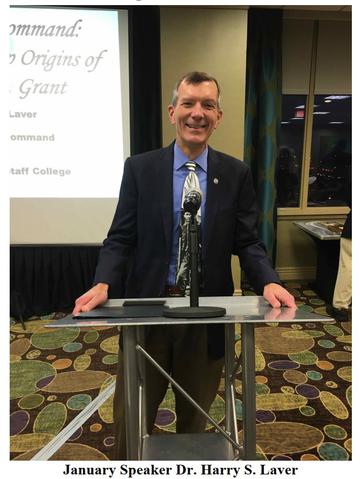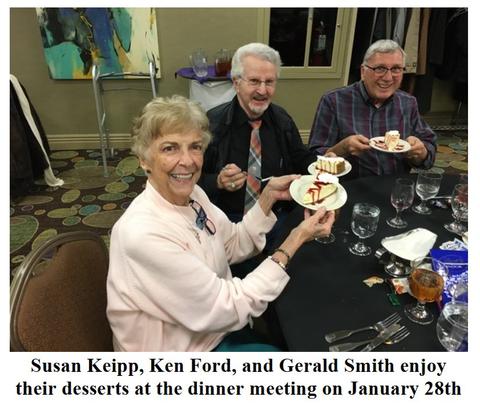January 2020

At our dinner meeting on January 28th, Dr. Harry S. Laver of the U.S. Army Command and General Staff College in Fort Leavenworth gave an excellent program about Union General Ulysses S. Grant. The title of his presentation was: “Genesis of Command: The Leadership Origins of Ulysses S. Grant.” Total attendance at the January dinner meeting was 53. The following is a summary of Dr. Laver's presentation:
- Grant was the greatest Union general of the Civil War. Under his command, the Union Army captured three Confederate armies.
- None of the great commanders of the Civil War were bom great commanders. They became great commanders by learning through study and experience. Nothing about Grant would indicate greatness.
- Grant received an appointment to West Point, but he did not want to go. His father made him go. As a student, Grant was mediocre. He was good at math and excelled at horsemanship. Grant graduated in 1843, 21st out of 39 cadets.
- During the Mexican War, Grant won citations while serving under General Zachary Taylor and General Winfield Scott. Grant watched how General Taylor performed during battle.
- After the Mexican War, Grant was stationed on the west coast. He was isolated, bored, and missed his wife and children, who were back in Illinois. Grant began drinking and then resigned from the army in 1854. His rank at that time was captain.
- Grant headed back east but failed as a businessman, an investor, and a farmer. In 1860, he hit rock bottom and went to work at his father's leather business in Galena IL. Grant's father was a relentless critic of Grant.
- When the Civil War began in 1861, Grant made his presence known. He was made a Brigadier General and assigned command of the 21st Illinois Volunteer Regiment.
- In July of 1861, Grant was ordered to move into Missouri. On July 17th, his regiment camped at Florida MO. Grant couldn't sleep because he was going into combat for the first time as the commander in the field. Grant led his men against the Confederate camps, but found out the Confederates had already retreated the night before. Grant realized the Confederates were as afraid of him as he was afraid of them.
- In November of 1861, Grant was ordered to cross the Mississippi River and attack the Confederate force at Belmont MO. Grant's men achieved initial success, but the Confederates reorganized and caught Grant's men by surprise. Grant reasserted control over his men and led them back to the steamboats. Grant had been tested but was not paralyzed by combat.
- In early 1862, Grant proposed to General H. W. Halleck to take Fort Henry on the Tennessee River and Fort Donelson on the Cumberland River. Halleck was initially opposed to the idea, but Grant and Rear Admiral Andrew Foote convinced Halleck to agree. Foote's gunboats destroyed Fort Henry and Grant's army captured Fort Donelson. Union General Charles F. Smith had advised Grant to accept no terms but unconditional surrender.
- Grant was lucky to have General Smith on his staff. Smith's approach to warfare was: (1) An officer must get his men ready for battle and (2) He must be willing to fight. Grant's philosophy was: (1) Find out where the enemy is, (2) Get at him as soon as possible, and (3) Hit him as hard as you can.
- Grant had shattered Confederate General Albert Sidney Johnston's defensive line across northern Tennessee. Grant decided that the rail junction at Corinth MS was the next point to attack. Grant intended to link up with Buell's Army of the Ohio before attacking the Confederate forces at Corinth. However, Johnston's army of 40,000 men attacked Grant's army at Pittsburg Landing (Shiloh) on April 6, 1862.
- When the Battle of Shiloh began, Grant was having breakfast at the Cherry Mansion in Savannah TN. Grant traveled by steamboat to the battlefield and arrived at 9:00 a.m. He saw that the Union Army was disorganized and large numbers of men were retreating toward the landing.
- Grant went to meet with General Sherman at Shiloh Church and found that Sherman was doing the best he could. Grant then met with General Prentiss and told him to hold his defensive position at the Hornets Nest at all costs. Grant then rode back to the landing and organized a strong defensive line on high ground near the landing.
- By early evening, Confederate General P.G.T. Beauregard believed that the Union Army was defeated and called off his attack. Grant's men were completely disorganized and had no sense of casualties.
- Later that evening, rain was falling and it was quite chilly. Sherman went to go find Grant. Sherman gets to the landing and finds Grant sitting under a tree. Sherman says: "Well, Grant, we've had the devil's own day, haven't we?" A determined Grant responded: "Yes, lick 'em tomorrow, though." Some Union officers had recommended retreat, but Grant chose to stay and fight at Shiloh.
- Grant's decision to stay and fight was made based on his life experiences: (1) His education and training at West Point, (2) What he had learned from his superior officers such as Zachary Taylor, Winfield Scott, and C.F. Smith, and (3) What he had learned about command and control during the chaos at Belmont and Fort Donelson. Dr. Laver said at that point, that is the Grant that we came to know as Grant.

|
| |